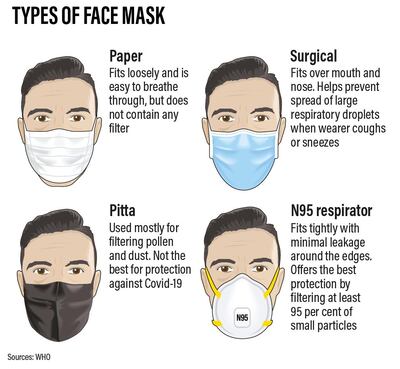From cheap, disposable surgical masks to a Dh700 personal face filtration system, the variety of face coverings to be sold during the coronavirus pandemic is mind-boggling.
In only a few months, an industry once reserved for medical professionals has become a global necessity and a multibillion-dollar gold mine for manufacturers.
Dr Azam Salih Mohamed, of NMC Medical Centre in Sharqan, Sharjah, looked at the pros and cons of five of the most commonly used masks in the UAE.
“We will be wearing face masks for at least another six months or so, even though we now have a vaccine for Covid-19,” he said.
“It will still take some time for that to be circulated to the extent where it becomes effective, so people need to continue wearing masks.
“They have become as important as our mobile phones, keys and wallets – we must not leave the house without one."
According to the UN, the protective wear industry is booming, with global sales of disposable masks expected to increase to $166 billion in 2020, up from about $800 million last year.
Strict rules on face masks have been in place in the UAE for months, with anyone found breaking them risking a Dh3,000 ($820) fine.
The World Health Organisation considers masks to be one of several key measures to curb the spread of infection.
Since the start of the pandemic, NMC medical centres have processed 104,000 PCR tests for Covid-19.
Doctors said that trend was likely to continue well into next year, which means masks will remain an important part of everyday life.
"There has been a lot of information out there about how people should be using face masks," said Dr Mohamed, who is from Iraq.
“It is not just important to consider which mask to wear, but to ensure they have one to put on when required.
“Education is improving and there are many different options now. The only question is which face mask you should choose.”
Disposable surgical masks
A box of the most familiar blue and white surgical face masks costs only Dh15 for 50.
Pros: Cheap but effective.
Cons: People reuse them repeatedly when they are old and ineffective. Disposable masks have also created an environmental headache.
“Some of the reusable masks should not be worn after 24 hours, because they will lose their effectiveness. They gradually deteriorate over time,” Dr Mohamed said.
Washable cloth face masks
Fashion masks are available in a variety of colours and designs and cost anything from Dh30 to Dh60.
Pros: Reusable and inexpensive, making them more environmentally sound.
Cons: Often poorly made and degrade quickly. Material masks need to be washed daily in warm soapy water to remain effective.
“Most patients I speak to choose to have the disposable masks or the cloth reusable face coverings, particularly if they have a larger family to consider, when it can get expensive,” Dr Mohamed said.
N95 mask with built-in valves
Companies such as Viromasks and Fine Guard manufacture reusable masks in the UAE that can be worn for up to a year and cost about Dh100 each.
Pros: Made with several layers of material to trap and kill viruses and the mask retains its antibacterial properties after up to 40 washes.
Valves on either side of the mask add to the filtration level for the wearer.
Cons: Slightly more expensive and cumbersome than the lighter, disposable alternatives.
“The N95 masks with ventilation are good for medical professionals because they offer protection and also enable communication, which is clearly important for them,” Dr Mohamed said.
Exercise masks and gloves
UAE company Fine Guard expanded its manufacturing line this year from paper products to face coverings that use bacteria-repelling materials.
It has been one of the pandemic’s few success stories, expanding production and increasing its range to a line of children’s products, gloves and sports masks.
A sports mask and gloves package suitable for use at the gym costs about Dh200.
"The material is very light and breathable, so would work well if someone wanted to wear the mask and gloves while working out or cycling," Dr Mohamed said.
“The general advice is not to wear masks during strenuous exercise, but this is a comfortable face covering that can be worn easily.”
LG Electronics PuriCare Wearable Air Purifier
At a hefty Dh699, the PuriCare is the most expensive consumer face mask on the UAE market, but promises total protection while filtering ambient air.
On a full charge, the lightweight mask offers eight hours of protection, filtering pollutants from the air before it is inhaled.
It has been three years in the making and hit the UAE market this year as the demand for face masks reached its peak.
Pros: Dual fans outside the mask allow the user to breathe in clean, filtered air, with adjustable speeds to suit respiration rates.
A silicon pad offers a comfortable fit and air flow is regulated to stop the mask becoming too warm and avoid the common problem of fogging your glasses.
Cons: By far the most expensive face mask in the UAE, cumbersome to wear and can be difficult to communicate because it makes you sound like Darth Vader.
“The PuriCare mask is rechargeable so it can be used repeatedly, but it is so expensive,” Dr Mohamed said. “You have to speak loudly to be heard so communication is difficult, but it is surprisingly comfortable.”








